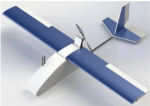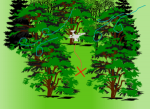Four different projects developed by the 2nd, 3rd and 4th-year students of our Electrical and Electronics Engineering Department under the advisorship of Asst. Prof. Haluk Bayram, a faculty member of the department, have been accepted by the “TÜBİTAK 2209-A – University Students Research Projects Support Program“. The projects are carried out in the Field Robotics Laboratory and support innovation in technology.
“Low-Cost Fixed-Wing UAV Design and Implementation to Support the Creation of Forest Inventory” Project – Ahmet Buğra Büyükarslan, Umut Dumandağ
 The mechanical, electronic and software design and implementation of a low-cost fixed-wing unmanned aerial vehicle will be carried out within the scope of the “Low-Cost Fixed-Wing UAV Design and Implementation to Support the Creation of Forest Inventory” project. The UAV will support the creation of a forest inventory by taking aerial photographs of the determined regions. A simulation model will be created for the UAV in Gazebo environment and system performance will be tested by field experiments.
The mechanical, electronic and software design and implementation of a low-cost fixed-wing unmanned aerial vehicle will be carried out within the scope of the “Low-Cost Fixed-Wing UAV Design and Implementation to Support the Creation of Forest Inventory” project. The UAV will support the creation of a forest inventory by taking aerial photographs of the determined regions. A simulation model will be created for the UAV in Gazebo environment and system performance will be tested by field experiments.
“In-Forest Autonomous Flight and Automatic Forest Inventory Creation” Project – Ferdi Dumandağ, Ebrar Şahin
 The project aims to implement a low-cost, real-time, detect-and-avoid multi-rotor UAV capable of autonomous navigation in the forest and collecting useful information for inventory. The UAV will gain practice in autonomous navigation through deep-learning technique applications and greater precision will be achieved for the useful information obtained by sensor fusion.
The project aims to implement a low-cost, real-time, detect-and-avoid multi-rotor UAV capable of autonomous navigation in the forest and collecting useful information for inventory. The UAV will gain practice in autonomous navigation through deep-learning technique applications and greater precision will be achieved for the useful information obtained by sensor fusion.
“Risk-Aware Autonomous Landing of Unmanned Aerial Vehicles in the Forest” Project – Derya Kara
 Due to environmental conditions, difficulties are encountered in the landing of multi-rotor UAVs in complex environments. In particular, equipment to be used in military operations, medical aid or personal cargo in disasters or other situations that require emergency assistance should not be damaged during the transport and delivery process. In the project, an approach that will plan the movement/landing of the UAV by taking into account the risk factors in the environment will be developed.
Due to environmental conditions, difficulties are encountered in the landing of multi-rotor UAVs in complex environments. In particular, equipment to be used in military operations, medical aid or personal cargo in disasters or other situations that require emergency assistance should not be damaged during the transport and delivery process. In the project, an approach that will plan the movement/landing of the UAV by taking into account the risk factors in the environment will be developed.
“Design and Implementation of Autonomous Surface Robot for Water Quality Monitoring” Project – Furkan Sarıyıldız, Denizhan Aras
 The project aims at the electronic and software design and implementation of a low-cost unmanned surface autonomous robot. The robot will be able to perform the tasks assigned to it autonomously. The tasks will be followed simultaneously by the ground station software to be developed. In addition, the surface autonomous robot will make water quality mapping as a result of the measurements it makes.
The project aims at the electronic and software design and implementation of a low-cost unmanned surface autonomous robot. The robot will be able to perform the tasks assigned to it autonomously. The tasks will be followed simultaneously by the ground station software to be developed. In addition, the surface autonomous robot will make water quality mapping as a result of the measurements it makes.
We congratulate our students and the faculty member and wish them continued success.

